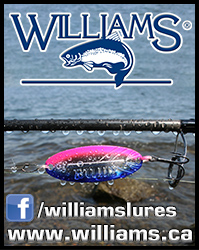Research to Monitor Movements of Walleyes and Lake Whitefish in and around Green Bay
Contact(s): Tom Meronek, DNR fisheries management, 920-746-2868; Mike Donofrio, DNR fisheries management, 715-582-5050
GREEN BAY - Staff from the U. S. Geological Survey, University of Wisconsin-Stevens Point, Wisconsin and Michigan Departments of Natural Resources, and the Great Lakes Acoustic Telemetry Observation System have initiated large-scale telemetry studies to determine walleye and lake whitefish movement in and around Green Bay.

Figure 1: Internal tag used to track movements of walleye. Whitefish tags are similar, but smaller.
Photo Credit: DNR
Researchers will implant transmitters into 300 walleyes and 400 lake whitefish during fall 2017. These transmitters are black cylinders (Figure 1) that are surgically implanted into the body cavity of the fish and periodically send out a coded signal that is detected by acoustic receivers.
This important research will provide important information regarding seasonal movements of these fish and help determine which spawning locations contribute to important fisheries that target these two species

Figure 2: External orange loop tag indicating fish has an internal tag that can be returned for $100 reward.
Photo Credit: DNR
"DNR staff are excited to work closely with a number of partners to conduct research that will help us better understand the habitat preferences and movements of walleye and whitefish," said Tom Meronek, DNR fisheries management. "Data gathered will provide important information to help sustain these critical fisheries into the future."
More than 150 acoustic receivers have been deployed to "listen" for tagged fish in and around Green Bay. Tags will allow tracking of fish for up to four years. In addition to acoustic tags, small temperature sensors will be placed into the same fish to better understand water temperature preferences.
All fish will also be tagged with an external orange loop tag (figure 2), indicating a $100 reward for return of the internal tag - recovered internal transmitters can be implanted in another fish to continue tracking efforts.
If one of these tagged fish is legally harvested, we ask that anglers do not freeze the fish and call (715-346-2178 or email dan.isermann@uwsp.edu to coordinate the tag's return and reward.










